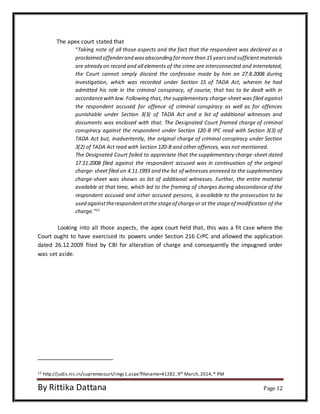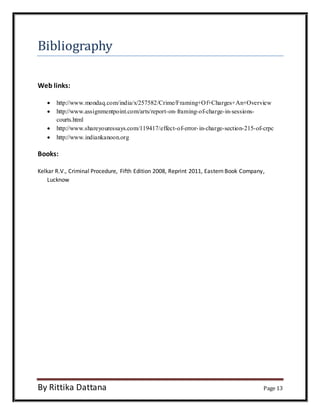The document summarizes key aspects of criminal charges under the Indian Code of Criminal Procedure. It defines what a charge is and discusses the purpose, contents, and errors related to criminal charges. Specifically, it notes that a charge gives the accused precise notice of the accusations against them to prepare their defense. It must state the offense, law violated, and essential facts like time, place, and details of the alleged crime. Precisely framing the charge is important to ensure a fair trial and due process.
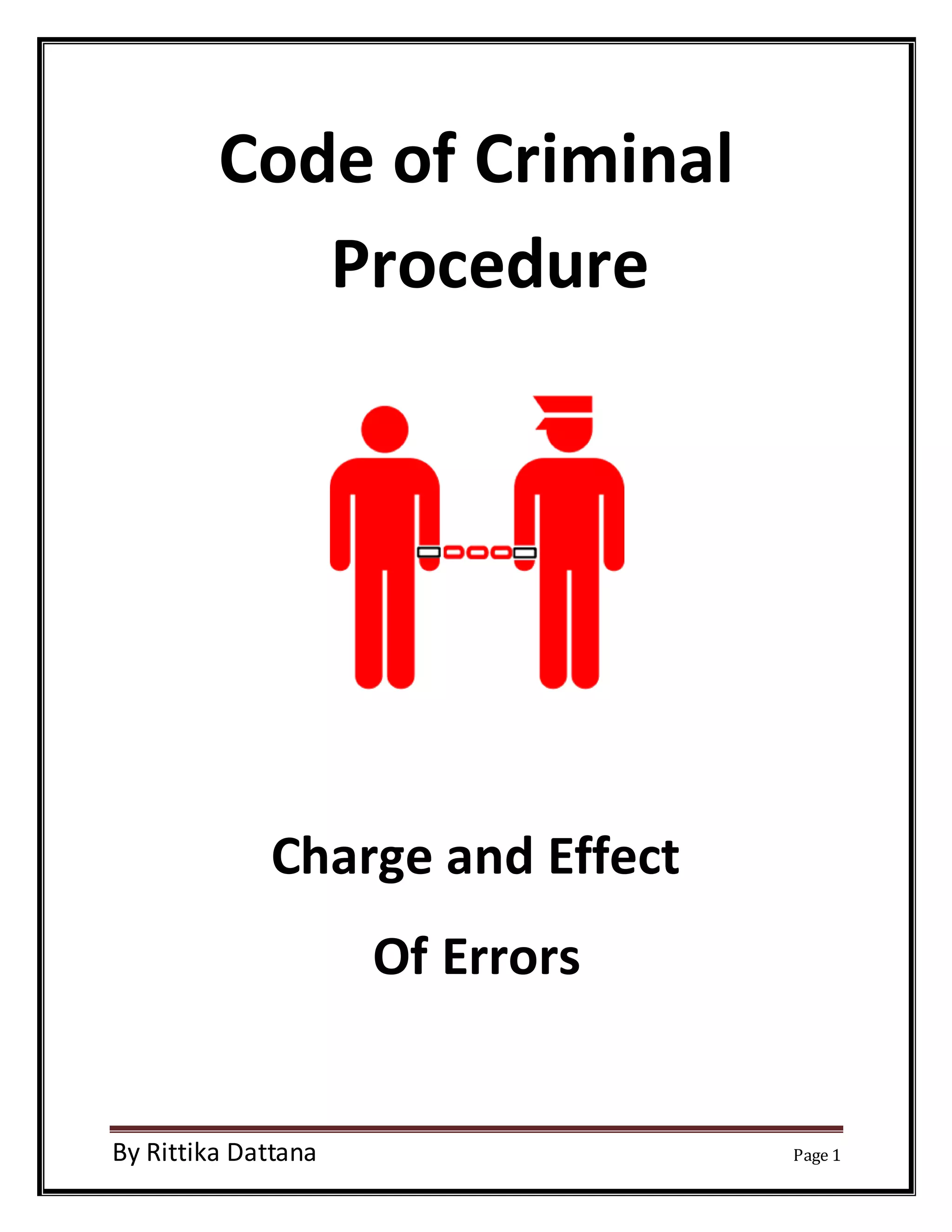
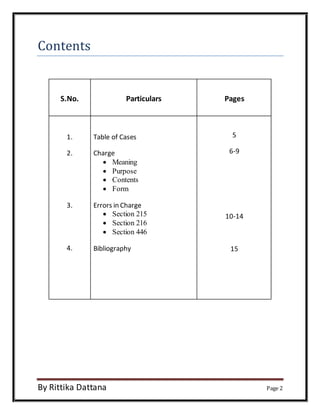
![Table of Cases
K.Veeraswami Vs Union Of India, (1991) 3 SCC 655
Inder Pal vs. Emperor, AIR 1936 Lah. 409
V.C. Shukla v. State, C.B.I.,1980 Supplementary SCC 92
Mohan Singh V. State of Bihar, [2011] 12 S.C.R. 327
Shashidhara Kurup vs Union of India, AIR 2013 SC 840
Rawalpenta Venkalu vs State of Hyderabad, 1956
Kailash Gir vs V K Khare, Food Inspector, 1981
Darbara Singh v. State of Punjab, AIR 2013 SC 840
C.B.I. Vs. Karimullah Osan Khan, 4th March, 2014
By Rittika Dattana Page 3](https://image.slidesharecdn.com/crpc2-141020090005-conversion-gate01/85/Crpc-2-3-320.jpg)
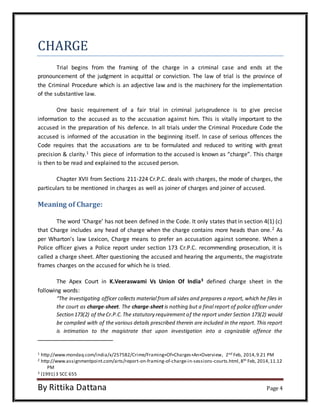
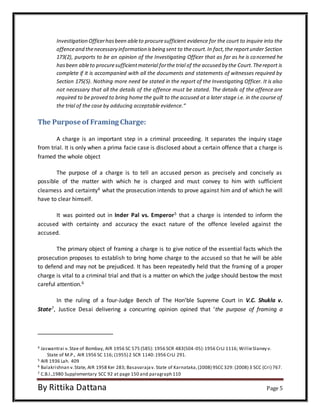
![charge is to give intimation to the accused of clear, unambiguous and precise notice of the
nature of accusation that the accused is called upon to meet in the course of a trial’.
Thus one of the main purposes of another purpose of a charge is to serve the principles
of natural justice “No one should be condemned unheard”. The other purpose of a charge is to
substantiate the principle of presumption of innocence of the accused, in other words, criminal
standard of proof. The prosecution has to prove a case against the accused beyond reasonable
doubt.
Contents of Charge
Section 211 specifies the contents of a Charge as follows:
(1) Every charge under this Code shall state the offence with which the accused is charged.
(2) If the law that creates the offence gives it any specific name, the offence may be
described in the charge by that name only.
(3) If the law that creates the offence does not give it any specific name so much of the
definition of the offence must be stated as to give the accused notice of the matter with
which he is charged.
(4) The law and section of the law against which the offence is said to have been
committed shall be mentioned in the charge.
(5) The fact that the charge is made is equivalent to a statement that every legal condition
required by law to constitute the offence charged was fulfilled in the particular case.
(6) The charge shall be written in the language of the court.
(7) If the accused, having been previously convicted of any offence, is liable, by reason of
such previous conviction, to enhanced punishment, or to punishment of a different kind,
for a subsequent offence, and it is intended to prove such previous conviction for the
purpose of affecting the punishment which the court may think fit to award for the
subsequent offence, the fact date and place of the previous, conviction shall be stated in
the charge; and if such statement has been omitted, the court may add it at any time
before sentence is passed.
In Mohan Singh V. State of Bihar8, it was held that where in charge no mention of Section 302
of IPC was there, but mentioned that the accused had murdered the deceased, then all the ingredients
of the charge were considered to be mentioned and the requirement of Section 211, sub-section (2) was
complied with.
8 [2011] 12 S.C.R. 327
By Rittika Dattana Page 6](https://image.slidesharecdn.com/crpc2-141020090005-conversion-gate01/85/Crpc-2-6-320.jpg)
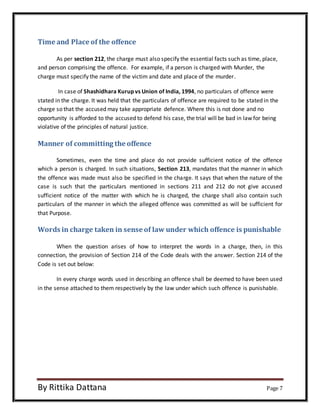
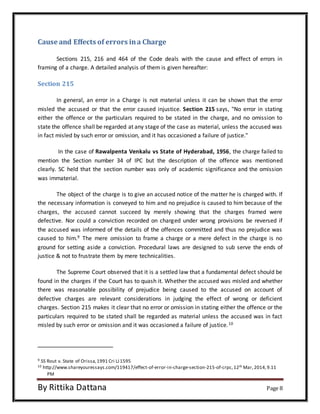
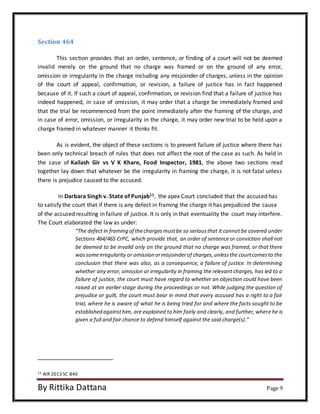
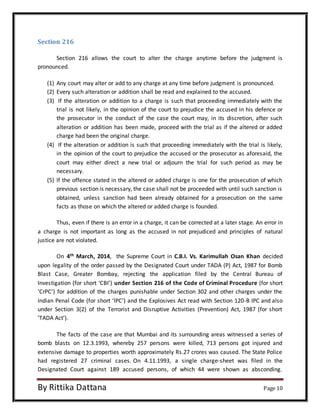
![Investigation from the State Police was transferred to CBI on 19.11.1993. CBI, later, submitted
supplementary reports before the Designated Court under Section 173(8) CrPC and the case
was registered as Court Case No.BBC-1 of 1993. During the course of investigation, the
involvement of the respondent accused, by name Karimullah Osan Khan, was disclosed and
efforts were made to arrest him. The Designated Court issued proclamation against him and, on
5.8.1994, he was declared as a proclaimed offender. Later, the Designated Court, on 8.9.1994,
issued warrant of arrest against him.
The Designated Court framed a common charge of criminal conspiracy on 10.4.1995
against all the accused persons present before the Court and also against the absconding
accused persons, including the respondent under the following Sections:
1. Section 3(3) of TADA (P) Act, 1987 and Section 120(B) of IPC r/w section 3(2) (i) (ii),
3(3), 3(4), 5 and 6 of TADA (P) Act, 1987 and r/w Section 302, 307, 326, 324, 427,
435, 436, 201 and 212 of IPC.
2. Section 3 and 7 r/w Section 25(1A), [1B(a)]. of the Arms Act, 1959.
3. Section 9-B (1),(a),(b),(c) of the Explosives Act 1884.
4. Section 3, 4(a), (b), 5 and 6 of the Explosives Substances Act, 1908.
5. Section 4 of Prevention of Damage to Public Property Act, 1984.
Karimullah Osan Khan, who was absconding, was arrested in Mumbai on 22.8.2008, and
was remanded to the police custody and investigation was carried on. During further
investigation, the respondent accused made a confession which was recorded under Section 15
of the TADA Act, wherein he had admitted his role in the criminal conspiracy, for which the
above mentioned common charges had been framed. On completion of investigation, a
supplementary charge-sheet dated 17.11.2008 was filed against the respondent accused for
offence of criminal conspiracy as well as the offence punishable under Section 3(3) of TADA Act
and lists of additional witnesses and additional documents were enclosed along with the
supplementary charge-sheet. On 1.1.2009, the Designated Court framed charge of conspiracy
against the respondent accused under Section 120-B IPC read with Section 3(3) of TADA Act
but, it is the statement of CBI, that inadvertently the original charge of criminal conspiracy
under Section 3(2) of TADA Act read with Section 120-B IPC and other offences applicable were
not mentioned. On 3.2.2009, the evidence was closed by the CBI and on 6.2.2009, the
statement of the respondent accused was recorded. CBI, as already indicated, filed an
application on 26.2.2009 under Section 216 CrPC for alteration of charge by addition of the
charges punishable under Section 302 IPC and other charges under the IPC and the Explosives
Act read with Section 120-B IPC and Section 3(2) of the TADA Act. The Designated Court, on
28.4.2009, rejected the application filed by the CBI, against which this appeal has been
preferred.
By Rittika Dattana Page 11](https://image.slidesharecdn.com/crpc2-141020090005-conversion-gate01/85/Crpc-2-11-320.jpg)
